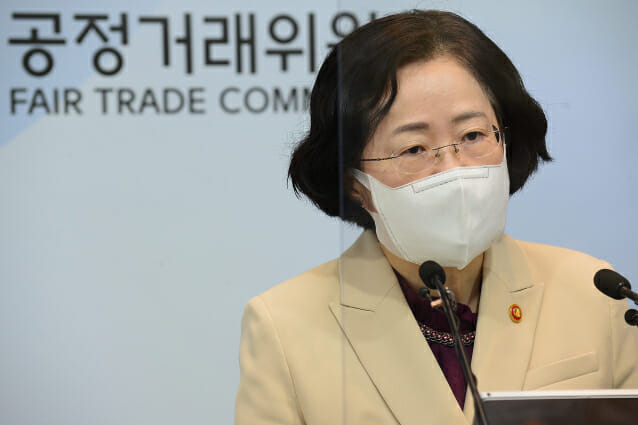
The Fair Trade Commission’s recent amendment to the E-Commerce Consumer Protection Act (hereinafter referred to as the Transitional Commercial Act) proposed by the Fair Trade Commission to regulate online platforms in line with market conditions has expressed strong concern that Internet companies may hinder the development of the digital industry.
It is a law designed to effectively remedy consumers’ damage, but it is because they are obligated to be overly legally liable for being a platform intermediary, which can disrupt business operations.
In addition, in the case of C2C disputes such as the carrot market, the platform is obliged to disclose personal information such as the user’s name, address, and phone number, causing excessive controversy over the provision of personal information.
It is pointed out that the Internet industry can rather regress the digital economy through uniform regulation because the government protects consumers. The confrontation between the government and the Internet platform, which intends to pass the law in the near future, is expected to intensify.
Recently, the Fair Trade Commission announced a legislative amendment to the Commercial Act on the grounds that as the spiritual power occupied by platforms such as Naver, Kakao, Coupang, and the People of Delivery in the digital economy has been strengthened, a threat to various transaction relations has occurred.
In the process of purchasing a product through an e-commerce platform, the commerce law aims to ensure that consumers are responsible for the position and role of the platform when something that may cause damage to the consumer occurs.
Until now, platform operators have been exempted from being exempted for being an intermediary, but the FTC has devised a countermeasure to prevent this. This means that if a product is purchased from Naver or Coupang, they and the store company must take responsibility for the problem.
The Internet platform industry agrees with the revision of the commerce law in line with the digital era, but is dissatisfied with the push without sufficient opinions from core stakeholders such as business operators, consumers, and academia. It is explained that the opinions of stakeholders were not reflected by holding a discussion meeting by selecting only the main points without disclosing the details of the amendment.
He also criticized the fact that the various consumer protection methods currently being implemented by startups are neglected, and rather, they are transferring responsibility to consumers.
For example, in the case of Carrot Market, it has built its own platform service to minimize the exposure of personal information to consumers in case of a transaction dispute, aims to resolve it on the platform, and strengthens the platform’s arbitration role rather than a direct dispute between the parties.
In order to resolve consumer disputes and respond to fraud, the company has been faithfully providing necessary information when a request for cooperation is received from a third agency or an investigative agency.
However, in order to protect consumers in e-commerce between individuals in the amendment to the previous commercial law, the Fair Trade Commission must confirm matters prescribed by Presidential Decree, such as the name, phone number, and address of individual sellers, and in case of dispute, provide the information to the consumer to resolve the dispute. It stated that we must cooperate.
If the individual seller’s information is not provided or the information provided is different from the facts, the platform shall also be liable in solidarity with the individual seller for damages incurred to the consumer due to the intention or negligence of the individual seller.
The industry urged a full review of the’Article 29 of the Interpersonal E-Commerce Act’ containing such contents.
It is because e-commerce is defined as an e-commerce transaction, and the provision of identity information of individual sellers is the same as the disclosure of personal information of 20 million consumers.
The Internet Enterprise Association and the Korea Startup Forum issued a joint statement on the 7th and said, “Providing personal information on real names, phone numbers, and addresses directly to the parties to the transaction will not only seriously invade personal information, but also raise disputes and raise social unrest. “In the process of dispute, the’identity information’ of another person acquired by an individual user is not automatically destroyed after the transaction is terminated, so if the personal information is abused for malicious purposes, the personal safety of good users is threatened. It could be caused,” he said.
Related Articles

Popular Association·Cospo “The Fair Trade Commission’s One-Way E-Commerce Act needs to be revised”

Fair Commission Chairman Sung-wook Cho, urged the people of Delivery to “strengthen the provision of information for consumers”

Automatic payment for paid conversion after free OTT experience, influencer back advertisement is not possible

FTC strengthens monitoring related to search advertisement display
“Eventually, the e-commerce law, which must guarantee and protect the safety of consumers, can overthrow the responsibility of resolving disputes directly to individuals, and induce excessive personal information infringement, which can greatly reduce the safety of the general public as well as the innovative service ecosystem.” He emphasized.
“Even though the interpersonal transaction platform bill is the first law to be established, the process of collecting opinions on related companies has never been conducted, so a full review is urged, and consumers’ rights are safely protected and innovative start-ups by carefully reviewing the actual site situation. “A rational bill that does not prevent the growth of the company should be presented.
